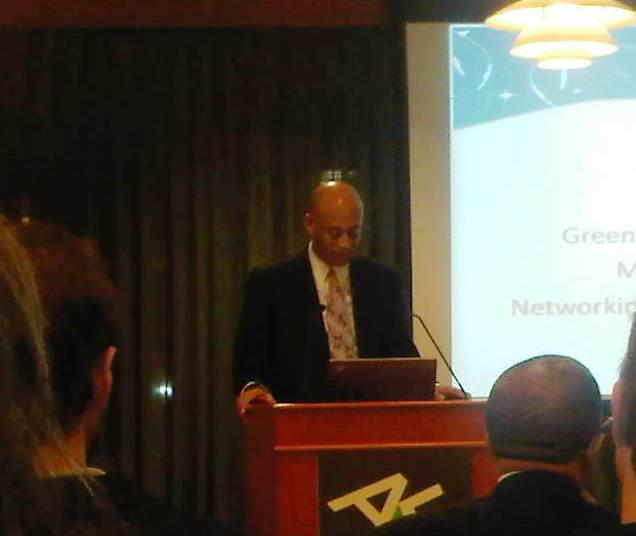“Most of us here today recognize that, by using less energy, LEED certified buildings save money, reduce greenhouse gas emissions and contribute to a healthier environment for residents, employees and the community,” said Minister Richards.
“These are all of course things which we at the Ministry of Environment and Planning and, indeed, all of my colleagues in the One Bermuda Alliance strongly applaud.”
 The Hon. Sylvan Richards JP MP gave his first public speech at the Green Building Forum.
The Hon. Sylvan Richards JP MP gave his first public speech at the Green Building Forum.
Minister Richards’ full statement follows below:
Good afternoon everyone,
…and thank you for inviting me here today to open this panel discussion on such a current and significant topic as,… “Green Buildings and LEED certification.”
Firstly, allow me to thank Greenrock’s Green Buildings Forum and the Bermuda Facilities Managers Association for hosting this worthy event. I would remiss if I did not stress to you that any ideas which the Government might adopt in our own buildings comes from experience ‘on the ground’ represented by those of you in this room today. So thank you. Your voices are heard and appreciated.
Most of us here today recognize that, by using less energy, LEED certified buildings save money, reduce greenhouse gas emissions and contribute to a healthier environment for residents, employees and the community.
These are all of course things which we at the Ministry of Environment and Planning and, indeed, all of my colleagues in the One Bermuda Alliance strongly applaud.
However ‘Green building’ goes beyond reducing energy use or improving indoor air quality… It’s a whole-house approach that ultimately benefits builders, buyers and the environment….
…And on a macro scale, it also has benefits for us as a nation. These benefits include:
- Less reliance on fossil fuels;
- Reduced greenhouse gas emissions;
- Lower medical costs thanks to healthier, safer living conditions;
- And job creation in the energy-efficient building materials & equipment industry
According to the U.S. Department of Energy, buildings accounted for 39.4 percent of total U.S. energy consumption and 67.9 percent of total U.S. electricity consumption in 2002. Although Bermuda’s make-up does not mirror the US exactly, these figures still help to put into perspective just how important the issue of ‘building green’ truly is if Bermuda is to change our total energy consumption levels.
You may recall that in 2011 the Government of Bermuda released the Energy White Paper, which provides a nine-year plan outlining the key energy policies needed to accomplish several goals, including:
- substantially reducing fossil fuel dependency,
- maintaining and improving energy security,
- and reducing greenhouse gas emissions below ten metric tonnes CO2 per person by 2020.
Chapter 6 of the White Paper deals specifically with how saving energy in buildings will help achieve these goals.
The Energy White Paper, to which the One Bermuda Alliance gives its full support, contains information on how energy auditing for buildings of all types will help us understand how best to use the technology we already have to dramatically reduce our power use.
Historically, there have been no mandatory requirements for energy efficient building design and few incentives to voluntarily develop and operate energy efficient buildings in Bermuda.
As a result, energy and operating costs have not really been a design consideration, and therefore retrofitting buildings can often be an onerous undertaking. If we can get those matters of efficiency designed into the building from the very first stages of project planning, then we have a much better shot at sustainability and responsible use of resources.
Operating costs of a building should be just as much a consideration as the original design and construction costs. LEED is a great way to encourage that, but changing the building codes will help even more, and we intend on making this our new reality.
In closing, I would like to recognise the efforts of the island’s Green Office Teams for seeking to change behaviour in their respective companies to reduce electricity demand and reduce resource use. It is often a thankless job as habits are hard to break.
And, finally, I would like to recognise the good work done by Greenrock and other environmental organizations in striving to reduce the island’s environmental footprint.
Thank You.

